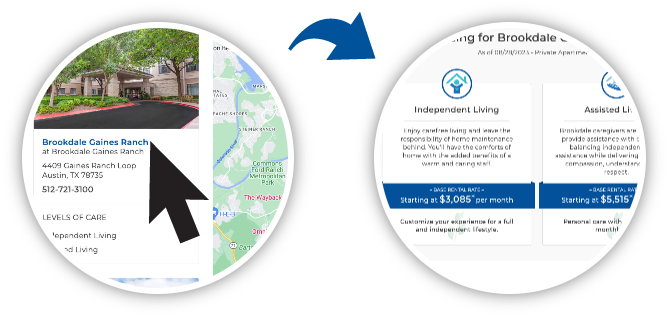- Home
- Healthcare Professional Referrals
- Blogs
- Distinct Dementia Caregiving Styles Can Help Improve Intervention Strategies
Alzheimer's & Dementia
May 1, 2023
Distinct Dementia Caregiving Styles Can Help Improve Intervention Strategies
While studies show that caring for a person living with dementia can take a physical and emotional toll, how caregivers actually provide care has been studied less often. To better understand the impact of the different caregiver styles, we asked Amanda N. Leggett, PhD, FGSA, to share her research for Brookdale’s Optimum Life® Continuing Education Series. Dr. Leggett is an assistant professor at the Institute of Gerontology and Department of Psychology at Wayne State University.
A noted investigator specializing in dementia, Dr. Leggett delineates caregiving styles among informal caregivers, the impact caregiving styles have on health, and how interventions might be tailored to different caregiving styles to help improve outcomes. Identifying distinct management styles for dementia patients and their families may help your practice develop interventions better suited to their specific needs and abilities.
The Research
To help determine caregiving styles, study participants within a 60-mile radius of the University of Michigan-Ann Arbor campus were interviewed in-person regarding their cognitive and behavioral management of a care challenge and the values guiding their decision-making. Caregivers’ cognitive and behavioral management strategies were compared using a robust qualitative methodology.
On average, study participants were:
- Primary family caregivers for persons with dementia
- Age 64 years
- Care providers for a total of approximately 55 months
- 74% women
- 18% non-white
The Results
Dr. Leggett’s research determined that dementia caregiving style could be defined by cognitive beliefs, readiness to change, and behavioral strategies toward dementia management. These distinct caregiving styles affect decision-making, experiences, receptivity to and participation in interventions and outcomes for both the caregiver and the person living with dementia.
The five distinct caregiving styles identified are:
- Externalizers: Self-focused with a superficial understanding of impact on their care recipient. Frequent expressions of anger or frustration. Good at expressing the challenges they face.
- Individualists: Emotionally removed and lacking in management strategies. Provide care by “going it alone” with an approach that is successful for the time. Observant. Usually effective at accomplishing goals.
- Learners: Recognize the need to change their approach but can be stuck and emotionally turbulent. Willing to accept help and try new ways of managing care.
- Nurturers: Show positive effect and empathy toward care. Reflect a natural mastery.
- Adapters: Have a collection of acquired management strategies. Adjust to challenges.
Each caregiving style responds differently with various approaches. As clinicians, you may determine that some styles work better with support groups, while others do not. Some caregiving styles may be better suited to certain phases of dementia.
In helping caregivers understand their management styles, there is no optimal method. Each type of caregiving has its own strengths as well as areas for growth. By understanding the various ways caregivers manage people living with dementia, interventions can be better tailored to produce more optimal outcomes.
At Brookdale, we want to provide you with information to help facilitate conversations with your patients and their families. To access a Brookdale-sponsored Continuing Education session in your area, please click here. You can also download our full Optimum Life® Continuing Education Series flyer for more details.
Categories
- Alzheimer's & Dementia
- Caregiver's Corner
- COVID-19
- Health, Safety and Wellness
- Financial Well-Being
- Passion & Purpose
- The Journey to Senior Living
- Trending Now
- Socialization & Relationships
- Brookdale Solutions
- Brookdale Vision and Growth
Archives
View All
- November 2025
- October 2025
- September 2025
- August 2025
- July 2025
- June 2025
- May 2025
- April 2025
- March 2025
- February 2025
- January 2025
- December 2024
X
Let us help find the right community for you!
Complete the form and a Senior Living Advisor will be in touch!


